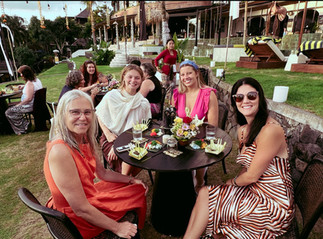From Conviction to Connection: My Faith, Rewritten
- Get Connected with Brooke
- Jun 27, 2025
- 14 min read
Updated: Jun 28, 2025
Somewhere along the way, we got lost.
Before religion became a performance, a system, or a political tool, there was something sacred about it. A sin wasn’t something meant to convict or guilt you into submission. It wasn’t designed to keep you afraid. It was an invitation to course correct, to return to your truest self. A "sin", in its original essence, wasn’t meant to condemn you to an eternal punishment. It was simply a behavior, a pattern, or a choice that pulled you away from wholeness, away from your highest self. Sin was anything that confined your spirit, made you sick, dimmed your light, or dulled your joy.
In fact, the word "sin" in ancient Hebrew, ḥāṭāʾ, literally meant “to miss the mark”. Like an archer missing their target. It wasn’t about being bad or broken. It was about straying from alignment with your truest self or purpose. Sin was a signal, not a sentence. It wasn’t something others could wield against you or use to judge you, it was your own internal knowing, a compass meant to help you correct your spirit and come back into alignment. It was never about external condemnation. It was about personal awareness and the invitation to recalibrate your soul.
Example:
Just like you’re witnessing teens today give new meanings to words, history has done the same thing over and over again. Traditionally, “slay” meant to kill or destroy, often used in serious or violent contexts. But in modern slang, “slay” now means to do something exceptionally well or to look amazing.
“She slayed that performance.”
This shift shows how language evolves, just like how historical translations have shaped the way we understand and apply spiritual terms like “sin”.
Words evolve, interpretations shift, and yet we cling so tightly to today’s understanding of religious language as if it’s always been that way. The danger is in forgetting that the meaning of sin, salvation, or even God, has been shaped by centuries of translation, cultural bias, and social conditioning. We act like these words were born with us. They weren’t. Unless we pause to question what they meant then, not just what we assume they mean now, we risk missing the point entirely. But here is the thing, most religious followers listen to their preacher instead of their own internal connection to God. Trusting a preacher to have ALL the understanding is just lazy. Jesus didn't say to follow your preachers, but we won't get into that here.
Early Christian theologians like Origen described sin as a kind of "spiritual illness" , not a crime deserving shame, but a condition in need of healing. Just like a poor diet makes the body sluggish, unaligned choices make the soul sick. That’s the truth so many modern interpretations have lost.
Lying creates spirals of shame and disconnection. Gluttony, or eating in ways that burden the body, slows your ability to feel alive and energetic. Alcohol raises cortisol, drains your vitality, and clouds your clarity. Envy, coveting your neighbor, lowers your frequency and turns your attention outward instead of inward.
Sins are a compass, a way to find your way back to center, but today, that compass has been hijacked and replaced with shame, judgment, and hierarchy. So, our connection to God has been tampered with, while our connection to our self, somewhat stripped and gone.
Even the idea of the "temple" has shifted.
In ancient traditions (aka those before our time) like Hindu, Egyptian, and Greek cultures, temples were places of "energetic healing and spiritual recalibration". They were often filled with flower gardens, sacred geometry (intentionally articulated beauty), incense (smells to connect your to your senses), and SILENCE. People went not to impress anyone but to rebalance and return to something greater than themselves. Temples were safe spaces, soft, still, and full of reverence.
Over time, these sacred spaces evolved into modern-day churches, but something vital was lost in translation. The focus shifted from internal reflection to external appearance. Instead of entering in stillness, many now arrive in performance, dressed in their “Sunday best,” not to cleanse their spirit, but to be seen, validated, and belong. The temple, once a quiet sanctuary for the soul, has become a building where comparison has replaced contemplation.
Somewhere along the way, the preachers took over the temples. Instead of preserving them as spaces for acceptance, healing, and quiet connection to the divine, they became the places of conviction and conformity. A place where if you miss a Sunday, you are shammed. A place where sermons replaced silence. Where guilt replaced grace. Where judgment replaced the invitation to simply be ourselves. What was once about removing the noise is now filled with it. The sanctuary turned into a stage...
Even Catholicism, with all of their ceremonial and ritualistic practices, still recognize the value of confession over conviction. Letting the soul breathe and release, instead of holding in guilt and shame. They understand the need to come clean, to speak it out, to unburden the soul but many modern Christians don’t want to confess. They want to suppress. To smile through it, spray it down, and cover it up with hairspray and hollow words. Performance is easier than presence and denial feels safer than transformation.
In the United States, where nearly 70% still identify as Christian and church attendance remains a cultural norm, conviction has become the currency of connection. Many walk into churches not to heal their ways, but feel like they belong. Meanwhile, the U.S. also leads in antidepressant usage, with roughly 11 out of every 100 Americans relying on pharmaceuticals to manage depression. This is far more than many European or Eastern nations. This contrast is telling. In Eastern cultures, where religious affiliation may be lower or more fluid, people often turn to connection, stillness, and practices like meditation, ancestral rituals, or daily temple offerings to restore a lost sense of self and connect with God. These forms of spiritual grounding emphasize internal harmony over external validation. In America, conformity to religious performance has replaced the soul’s deeper work. Instead of creating space for spiritual repair, we’ve normalized suppression and called it salvation. The discomfort of our inner misalignment gets masked rather than met, and as a result, we medicate what other cultures may meditate- sit with, breathe through, or spiritually realign.
For many, church is less about transformation and more about tradition. People started showing up not necessarily to deepen their spiritual connection, but to feel a sense of belonging, friendship, community, a place to feel safe from fear of the unknown. People needing to feel validated or welcomed as humans do. That longing for connection was passed down to their kids, and their kids after them, embedding itself so deeply into generational memory that it feels like DNA. It’s hard to break away from something that’s been wrapped around your identity for so long. I get it. I know what that feels like. It was rough.
I remember what it felt like to question what I was taught. To feel the weight of shame, the sting of guilt, and the haunting echo of my preacher’s voices in my head when I tried to explore something new or questioned things. When I started turning toward practices that helped me actually heal and align with who I truly am, I began to see things differently. “Leaving Jesus", as I once understood him, felt like betrayal but after of years of a toxic relationship with religion, eventually, I figured out it wasn’t Jesus I was trying to break up with. It was the church that had forsaken me and led me astray.
It wasn’t a conviction from Jesus that I had been feeling inside, but a conviction shaped by the preachers' interpretations and translations of Jesus’s words and work from thousands of years ago.
As I began to open my mind more and more, and traveled to understand the world outside my walk, I realized that Jesus is everywhere-maybe behind the name of another religion, another tradition, another language. I came to realize I need Jesus but I don’t need the church. Who was I to let the church break me from my relationship with him?
So many people wouldn’t understand that unless they truly grasped how history works, how it bends, shifts, and gets reshaped by power, translation, and time. We’re rarely taught to question our own confirmation biases, to look beyond what we’ve inherited. It’s like the documentaries we watch about cults, where children are raised in tightly controlled, brainwashing environments and grow up knowing only what they were taught. The beliefs become so deeply rooted, the conviction so strong, they can’t imagine another way. And as outsiders, we watch and think, How awful to believe that’s the only way they will live their lives. We want to "save" them, right?
Here’s the irony: now, as someone who’s stepped away from the traditional church to find a deeper, more personal relationship with Jesus, I’ve become one they want to “save". Christians look at me with concern, trying to bring me “back” to the church, not even trying to understand that I never left Jesus. What I left was their version of him so that feels wrong to them. And while they see my journey as rebellion, I look at them and wonder: When will you do the real work to find the happiness you seek and quit hiding behind your religion to save you? When will you step out of your own conformity, out of your controlled idea of faith, and into a truly connected, expansive relationship with God so that you can find real peace? One that doesn’t require you to save others so that you feel whole while masking your own sin, but shift to a higher focus of transforming yourself? When are you going to quit going to Jesus with all your problems through prayer instead of taking accountability for your shit wanting Jesus to feel sorry for you but you won't learn your own lessons here? When will you start using prayer as a way to unite your soul with God and live in abundance and gratitude instead of filling your prayer only with your despair?
Are you ready to have that conversation with me or is this the part where I’ve challenged your perspective, your beliefs, and now you feel triggered, ready to shut down or walk away?
Christians are often eager to speak at me, to save me, to correct me until I begin to speak back. Until I share my relationship with God. Not one that was handed down in a church pew or filtered through fear and guilt, but one built through direct experience, surrender, pain, healing, and relentless seeking.
My knowing makes people uncomfortable because it doesn’t follow the script. It doesn't rely on performance-based salvation, or shame-based conviction. It doesn’t come dressed in judgment or hierarchy. And because of that, it threatens the foundations of what some have been taught to believe without question.
Let me explain why-
When an idea or assumption doesn’t matter deeply to us, we’re often excited to question it. It feels more like curiosity: “Really? Tell me more!” There’s a thrill in learning something that challenges what we thought we knew. When a core belief is questioned, it’s like a mini dictator takes over in our mind-controlling the flow of facts and shutting out new perspectives immediately. This is known as the "totalitarian ego". Its job is to protect our self-image by filtering out information that threatens it.
We weren’t born with our opinions and beliefs. We adopted our opinions and beliefs based on the people around us. This is how social conditioning works. So it is likely that the very thing that triggers you to defend your belief is not even yours to own, but someone else's around you.
Neuroscientists have found that when our core beliefs are challenged, it can trigger the amygdala-the primitive “lizard brain". Instead of responding with our evolved, logical brain, we activate fight-or-flight response when someone challenges our beliefs. We can get angry. We can get scared. We sometime will double down.
Our wrong beliefs become shielded in a filter bubble, where we feel pride in seeing only information that supports them. We reinforce our beliefs in echo chambers, where only people who agree with us validate our views.
So look at your circle, look at what you’re surrounded by. Do you put yourself in environments that challenge your thinking so that you can expand and grow or do you take the comfortable route and surround yourself with the people that only think they way you do?
Listen, the goal shouldn't be for you to be wrong more often but to simply realize that we all are, more often than not wrong, and more than we’d like to admit. The more we deny it, the deeper the hole we dig. We deny ourselves learning new, just to support our ignorance and stay comfortable.
I say all of this as someone who still believes in Jesus. I believe He came, did all the miraculous things, walked in the image of God, and died for our sins but not so we could become hardened, closed-minded, and threatened by the discomfort of the unknown. Not so we could lose sight of love and become the very martyrs who hung Him up there in the first place.
I didn’t abandon my faith, I redefined my relationship with it. I still hold my beliefs, just in a whole new way. One rooted in love, not fear. In curiosity, not control. In presence, not performance.
Preachers love to talk about “born-again Christians”. Well baby, I just might be one. But I don’t think that’s what they meant to manifest. LOL.
The first time I was baptized, I did it from conviction, not connection. The preacher did a really good job of making sure I felt like a "sinner" that day. They have a magical way of doing that. I did it because I didn’t want to be punished one day. I did it because I wanted to be “okay” and “fixed.” I wanted Jesus to save me just that easily, without doing any real work on myself. It sounded pretty easy to just continue to live my sinful life and accept him in my heart knowing he would just forgive me for not doing any work on myself. I wasn’t ready to truly see differently or be differently. I became another impressive number for the church that day but I definitely didn't impress God. That came later.
Now, I walk with Jesus not because I’m scared of hell, but because I’ve tasted truth. I believe in him not as a gatekeeper, but as a guide. Not as a symbol of shame, but as the embodiment of radical, boundary-breaking love.
For me, the shift started one Easter Sunday. I had spent the entire week focused on the outfits, the baskets, the meals, and the photo ops. I remember yelling at my kids to hurry up, rushing to get everything “just right”, and by the time I finally sat in church, I realized I had completely missed Holy Week. I hadn’t been still. I hadn’t been present. I hadn’t been with Jesus, I’d been caught up in the performance and pressure of it all.
I didn’t really hear the preacher’s words; I was too busy thinking about the week that had slipped through my fingers and how there has to be more to life than this autopilot of monotony. The grocery store run for the ham, the candy for the baskets, the eggs for the hunt, the matching family photos for social media... it was all noise. It didn’t feel like honoring anything sacred. It felt like stress.
The church didn’t feel like sanctuary. That day I felt like I arrived to a performance, like walking into a room full of people more concerned with appearances than authenticity. That day I realized somewhere along the way, faith communities became breeding grounds for factiousness where division hides behind doctrine and people argue over righteousness while forgetting how to love.
I wondered: Why? Why was I running around all week, heck my whole life, when all I wanted was to feel connected?
Sometime that week, I also started digging deeper and I stumbled across the pagan roots of the Easter Bunny. I had never even thought to question it before but there it was another layer of clarity. I wasn’t celebrating Jesus that week. I was practicing a modern, commercialized version of Easter I had inherited without ever asking why. (Do your own research about the Easter Bunny and let me know what you think.)
That search led me to research even more. For example, I learned the tradition of dressing up for church didn’t come from Jesus. It emerged during the Industrial Revolution, when outward appearance became tied to class and status. Ancient spiritual teachings, and even Jesus himself, emphasized humility and inner cleanliness over fancy robes. He called out religious leaders for wearing elaborate garments while their hearts were impure.
That’s when it really hit me. I wasn’t just changing my Easter traditions. I was reclaiming my faith!!
The early Christian church was never about a building. The word ekklesia, used in the New Testament, meant “a gathering of people,” not a cathedral. The first followers of Jesus met in homes, caves, and under trees because the heart of faith was in community, not construction.
The next year, I did Easter differently. I decided we weren’t doing Easter the same way again. We were bringing Jesus home, to the table, to the kitchen, to the conversations. I cooked a meal, sat with my family, and I imagined Jesus sitting there with us, not looking for perfect outfits or polished prayers, but for presence. For love. For communion.
I know my words may reach people far beyond my Southern roots, and I respect all walks of faith and culture but please know I’m speaking from where I am, not where anyone else is. I can’t ignore what I see. Religion has become something people identify with more than something they seek for refuge. It limits more than it liberates and labels more than it loves.
Get a journal and write down the things you authentically live out that reflect the way Jesus lived. Be honest with yourself—this isn’t for anyone else to see. No one’s judging you. Don’t dress it up or sugarcoat it. Write your truth...
What do you actually do each day that aligns with Jesus’ way of being? How do you treat people, ALL people? Do you carry any sense of superiority from your religious beliefs, or do you move through the world humble at heart to all forms?
Don’t write the version of you everyone else sees. Write out the unfiltered "God's Honest" truth.
I urge you to consider that heaven and hell aren’t just "destinations" to arrive to one day. They live inside us, right here and now. Every choice we make pulls us closer to one or the other. Every decision is an act of creation. Everything we think, say, or do ripples out into our lives and shapes our internal state. Good or evil- we pick. Our reality, the one we chose can go either way. This manifests in our minds and starts with our beliefs. We do not have to be the victims of our circumstances, how we react to our circumstances is our reality that we chose.
You see, it’s not religion themselves that cause us to rebel against one another, react and respond. It’s our confirmation bias and totalitarian ego that keep that conflict alive. The need to always be right, to defend our version of truth as the only truth, is its own kind of sin. It breeds separation, pride, and fear through the unknown. It disconnects us from our most peaceful, joyful, and awakened state of being. When the ego shouts, the soul gets silenced. As long as we cling to certainty more than compassion, we’ll keep missing the mark.
So let me be clear. It’s not my mission here to make you fight your religion or lose faith. I’m not here to strip away your beliefs. I’m simply inviting you to become aware of how you think about them. Religion, in all its forms, holds immense beauty when approached with humility, dedication, and heart... but try telling that to someone whose ego is convinced their religion is the only “right” one and they won’t hear an invitation to expand, but they’ll hear an attack. An ego-led mind protects itself before it opens. A heart-centered spirit knows truth doesn’t fear questions. It welcomes them.
Here’s what I’ve come to believe above all else...
All religions, at their core, are saying the same thing. We are all connected. Whether you call it God, Source, the Divine, or the Universe, it’s all pointing us back to LOVE. Back to truth. Back to each other. The language may differ, the rituals may vary, but the heartbeat is the same. We are not separate. We are not strangers. We are one body, one breath, one being-each of us invited to wake up and remember who we really are.
Who are you? Do you truly "follow" Jesus and identify as yourself?
OR
Is identity connected to the church, and you follow your preacher?
Love you
-B
((Here are some photos from my trip to Bali. I saw more of Jesus in this predominantly Hindu country than I often do in my own that has almost a 70% Jesus "following". The grace. The humility. The joy. The gratitude. The acceptance. The love, uncomplicated and freely given. It wasn’t about religion. It was about spirit. Presence. Humanity. I felt it everywhere.))




















